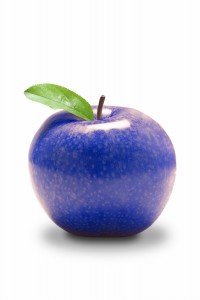
by Amy Castle, Guest Blogger for the Menuism Dining Blog

Professional chefs know that part of the secret of delivering delectable food is the way in which it is presented. As well as being cooked and seasoned properly, food needs to be presented in a way that is appetizing to the eye as well as to the palate. In a smart restaurant, every plate is carefully inspected before it is sent off by the waiter to the diner, to ensure that it fulfills its visual purpose.
Our eyes have been conditioned to see certain foods in a particular way and while some colors stimulate the taste buds, others are capable of killing the appetite.
A Blue Apple?
Vegetables that are red, green and yellow look appealing. But on the other hand, would you really want to eat a bright blue carrot?
What is this inbuilt visual attraction (or dislike) we have to foods? Why does it occur even when we are just looking at a photograph of foodstuffs, and are unable to taste or smell them?
Think about how you can be watching a cookery program on television and find your mouth watering at the sight of a tempting meal being prepared.
Taste and Sight
Taste is an incredible sense, sending information to the brain as to whether what you're eating is sweet, salty, sour, bitter or savory. Taste as a sense is made up of sight, smell, touch and resulting taste. So when you screw up your face in disgust as that moldy piece of bread is put in front of you, chances are your brain has already made its mind up before you put a bit in your mouth - which is why most people refuse the moldy offering prior to eating it.
So in fact, eating that piece of chocolate which sends a positive signal to your brain's receptors and lets you know you're enjoying it actually comes from a mixture of sight, touch, smell and the effect on your tastebuds.
The Unison of Five Senses
Our five senses operate together to give us a full picture. So you might be eating something with your hands - munching on an apple, say - and feel the firm crispiness of it in your fingers. This plays a great part in how we expect it to taste. Although smell plays the greater part in stimulating our appetites, our visual sense also has a big role.
Your brain is programmed to choose foods that will give your body the greatest nutrients. To get a balanced diet, you need a mixture of foods that are different colors - dairy is generally pale and white, vegetables and fruits a mixture of bright yellows, greens and red, meats often a rich brown. Your subconscious knows this, which is why you pause over the fruit bowl to pick an item you find visually appealing.
To counter this, your brain will also reject food that your eyes perceive as being dangerous to you - rotten fruit and vegetables, moldy bread, burnt or undercooked meat. This is backed by your sense of smell, as rancid and out of date items will generally smell bad.
Our eyesight triggers our taste buds along with our other senses of touch, taste, smell and even hearing to an extent (think of the sound of sausages sizzling in the pan). Furthermore, when your eyes see a plate of food in front of you and you choose not to eat it, chances are you're avoiding it because of past experience. Our eyes are incredible organs, sending messages to our brain which are stored for some time after. If that plate of food looks like it's Aunt Norma's awful meatloaf from last year's Thanksgiving meal, your brain will get the message that it is best avoided on this occasion, too.
On the Discovery Science channel's To See or Not To See, various tests were carried out with students of the culinary arts whereby they asked them to identify different sodas. Simple enough? Wrong. The sodas were dyed different colours which confused the students, landing many of them to wrongly identify different flavors due to their color. This is just one of many examples of how our sight can make us think contrary to our taste, and proves how powerful sight can be!
From the moment your eyes glance over to the buffet table and see the many foods on offer, chances are it's already made up its mind of what you'll enjoy before you even put it in your mouth.
Related Links from the Menuism Restaurant Blog:
• Dining Out, BrokeAss Style
• 10 Tips for Dining With Kids
• Taking Things With a Grain of Salt and Other Food Clichés
Does the Way We See Food Affect Its Taste? originally published on the Menuism Dining Blog.
Amy Castle blogs about health and wellness for leading glasses direct provider Direct Sight.